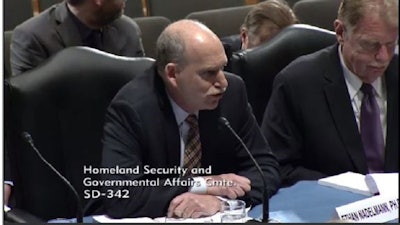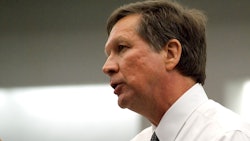
Drug Policy Alliance Exec. Director Ethan Nadelmann: War on Drugs Is “a Monumental Disaster”
By Noelle Skodzinski
Ethan Nadelmann, Ph.D., executive director of the Drug Policy Alliance – the nation’s leading organization promoting alternatives to the “war on drugs” -- was among several people who testified June 15 at a hearing, called America’s Insatiable Demand for Drugs: Examining Alternative Approaches, in the U.S. Senate Committee on Homeland Security & Governmental Affairs.
“I’ve been waiting for a long time to share some of my thoughts with members of the U.S. Senate,” said Nadelmann. “Let me just be frank. I fundamentally believe that the war on drugs in this country and around the world has been a monumental disaster. It’s been a disaster in public health terms. It’s been a disaster in public safety terms. It’s been a disaster in fiscal terms and a disaster in human rights terms.”
Nadelmann referred to a comparison raised earlier in the hearing to “the experiment of alcohol prohibition” “You look back at alcohol prohibition. … And what happened?” he posed. “We saw Al Capone and rising levels of organized crime. We saw all sorts of violence and bootleggers at the borders between Canada and Mexico, and all around the country. We saw overflowing jail cells and courthouses, we saw hundreds of thousands of Americans being blinded and poisoned and killed by bad bootleg liquor – liquor that was more dangerous because it was illegal. … We saw levels of corruption that were unparalleled in many parts of the country. … We saw rising levels of cynicism and disregard for the law.”
What we didn’t see, noted Nadelmann, was “any reduction in alcohol consumption.” “Alcohol use was as high at the end of prohibition as it was at the beginning,” he said.
Other countries, however, were successful at reducing alcohol use and abuse without prohibiting alcohol, he said. Instead they placed higher taxes on alcohol and tougher licensing restrictions, and increased public education, among other things. “An rather than putting billions of pounds … or whatever it might be, into the hands of traffickers and gangsters, they put it into government treasuries. It seems to me that was the better approach then, and there is a lot to be learned.
“Fast forward to right now: Drug prohibition has been a monumental disaster. … I think we developed an addiction … to drug war thinking, drug war ideology and drug war policies.
“And right now, thankfully, the country is finally in recovery from the drug war addiction of our past.”
Nadelmann said the issue of alcohol prohibition “applies mightily to the issue of marijuana prohibition.” He noted that he sees no evidence that marijuana laws are preventing people, young or old, from getting it. “All I see is evidence that it’s putting a lot of people in jail and costing the government a lot of money. Do you still support a marijuana prohibition policy knowing that it’s been totally ineffective?”
The best drug policy, Nadelmann says, he believes, “starts with the understanding that there’s never been a drug-free society … and there’s never going to be a drug-free society. … Our challenge is not to try to keep drugs at bay, or build a moat or a wall, between this country and others, or around our schools, what have you. That’s failed.”
The challenge is to “learn to live with [drugs] so they cause the least possible harm and, in some cases, the greatest possible good.”
The “optimal drug policy,” continue Nadelmann, “should try to do two things: It should seek to reduce the negative consequences of drug use – the death, the disease, the crime and the suffering, the devastation to families and individuals and communities. It should seek to reduce the harms of drugs,” he stressed. “And secondly, it must seek to reduce the harms of government policies, reduce the mass incarceration and the drug gangs … and all the negative health consequences and violations of civil liberties and human rights.”
Also testifying at the hearing were D. Scott MacDonald, M.D., Physician Lead, Providence Crosstown Clinic; David W. Murray, Senior Fellow, Hudson Institute; and Frederick Ryan, Chief of Police, Arlington, Mass.
Murray, who followed Nadelmann in testifying, suggested he was an “outlier” among those testifying. “I’m not convinced the evidence is as strong as it is often portrayed,” he said of the evidence of a failed drug war. “Is the war on drugs as success? It depends on how you define success.”
Murray said he believes that “When we move to a model of legalization, it weakens our approach,” namely in that it weakens societal norms against drug use.
“We unravel our drug policy almost every four to eight years. You cannot achieve sustained success” with that approach, he added.
Click here to watch the entire Senate hearing.


























